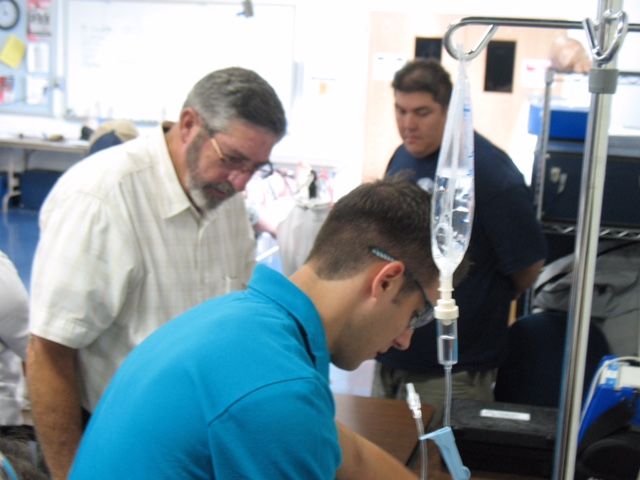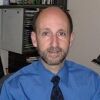In 1968, when 18-year-old Barry Eberly was ready for EMS, he barely noticed that EMS hadn’t been invented yet.
“My father was a firefighter and ambulance attendant at the Camden-Wyoming (Delaware) Volunteer Fire Company,” Eberly said. “Being a typical son, I joined as soon as I could and ended up on the ambulance.
“My first call was an automobile accident. Our patient was a young lady who was alert and oriented; even I couldn’t do her any great harm.”
The “ambulance attendant” title Eberly and his father shared was a primitive EMS certification.
“Delaware was a little slow to pick up the concept of EMTs, but the title didn’t matter to me as much as the way I’d been brought up,” Eberly said. “My parents raised my sister and me to help people. Volunteering turned out to be an extension of that.”
Between 1968 and 1971, Eberly discovered he was a much better volunteer than a student.
“I was attending the University of Delaware and wanted to keep riding, so I got permission to respond with Newark’s fire department,” he said.
“Back in those days, when I was still in some sort of physical shape, I’d actually run a mile-and-a-half from the dorm to the station to make an engine or ambulance. I ended up spending too much time on that, which made me something less than the world’s best student.”
A Rumor of war
Eberly had resumed volunteering at Camden-Wyoming when he was summoned for duty halfway around the world.
“In 1971, Uncle Sam gave me a call and said he’d like me to visit Southeast Asia,” Eberly said, wryly, of his draft notice. “I tried to get into EOD (explosive ordnance disposal), just for the challenge, but my captain told me, ‘You don’t want to do that.’
“I was assigned to medical laboratory school at Fort Sam Houston in Texas, where they made me a lab tech. From there I went to Cam Ranh Bay in Vietnam to do free-radical assays and thin-layer chromatography on soldiers who were being tested for drugs.
“I had volunteered for Dust Off (Army medevacs) but was told it was a higher priority to clear people from drug abuse than pull them out of the jungle.”
Eberly says he learned more during 17 months in the service than he had in his previous 21 years.
“It was mostly figuring out how to get along with all kinds of people in a variety of physical and emotional states – not unlike what we do in EMS.”
Back to the world
Eberly returned to Delaware in 1972 and took a job riding ambulances for the city of Dover.
“As I got closer to figuring out what I wanted to do with my life, there were rumors the city might send people to paramedic school. I went in 1979.
“A lot of that had to do with the National Highway Safety Act and the paper on accidental death and disability (in 1966),” Eberly said. “That turned into a national movement.”
After 17 years as a paramedic and supervisor, Eberly became an instructor at Dover’s Bayhealth Medical Center. He started to see himself and his fellow educators as EMS gatekeepers.
“I found out not everyone learns at the same speed. Additionally, students don’t get equal opportunities; one may get four really good teaching cases in a day, while another goes a week without anything challenging.
“There seems to be a mindset that succeed or fail, everyone deserves an award, but I think most people who work in medicine know that some are cut out for it and some aren’t. Teachers are well-positioned to be part of that decision-making process.”
Life refractory to death
Eberly found an unusual call in 1994 especially educational.
“My partner, Dawn, and I had been assigned two paramedic students during a 14-hour shift. Sometime during that night, we got a call for a cardiac arrest.
“We found the patient, a man in his 80s, sitting in a recliner, quite obviously not breathing and most likely pulseless. Nevertheless, the student acting as team leader tried to engage the gentleman in conversation.
“Well, Dawn gave that kid a moderate hip check and advised both students they’d better start using some of the equipment we’d brought with us.
“It was one of those runs where you get complexes, pulses, and even respiratory effort every now and then. I was hopeful for a while, but we had pulseless bradycardia at the hospital. When that became asystole, the ER physician pronounced the patient. Then he changed his mind when I told him we’d seen signs of life earlier.
“We gave it another 20 minutes or so, during which the patient once again went into PEA followed by asystole. The physician pronounced him a second time, then went to talk to the family. Someone covered the patient with a sheet and we left the room.
“One of the hospital custodians who’d been cleaning up in that bay came to get me about five minutes later. He thought I’d want to see what was going on. He was right: The sheet over the ‘dead’ patient was rising and falling! I told the custodian to find the doctor, tell him not to say anything more to the family and come back right away. Then we took the sheet off and resumed resuscitation.
“The following morning that patient was extubated. He lived another three-and-a-half years neurologically intact.”
A slower pace
In 2014, after 46 years in EMS, Eberly retired.
 |
| Eberly monitors students in the simulation lab. (Image Barry Eberly) |
“I’d been doing clinicals with students,” he said. “Sometimes we’d go 16 or 20 hours without seeing a patient older than me. I figured maybe the big EMS god in the sky was trying to tell me that now would be a good time to get serious about fly-fishing and golf.
“The truth is I miss EMS enormously. You develop a lot of relationships. It’s very satisfying to see people you’ve taught go out and do good things.
“On the other hand, I do enjoy fishing and golf.”
Author’s note: Eberly and Bruce Nepon are co-authors of the book and is the autobiography of Marine Lieutenent Philip J. Caputo and his 16-month deployment to Viet Nam as Caputo explains, of “the things men do in war and the things war does to men.”












